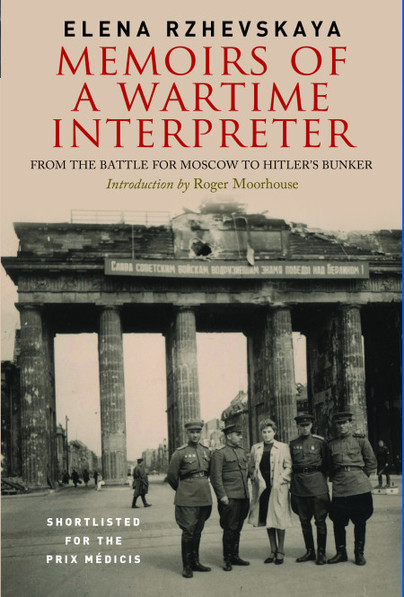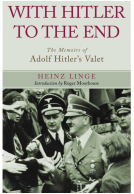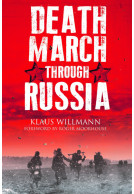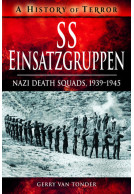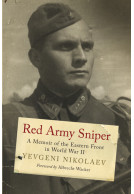Memoirs of a Wartime Interpreter (Hardback)
From the Battle for Moscow to Hitler's Bunker

Pages: 329
Illustrations: 20
ISBN: 9781784382810
Published: 3rd April 2018
Last Released: 24th October 2018
National publicity!
As seen in the Mail On Sunday (April 2018); 'The woman who held on to Hitler's teeth: The strange story of how a Russian girl was tasked with proving the Fuhrer's death... from only a grisly fragment of jawbone'
As seen in The Sun; 'How Adolf Hitler's teeth provided grisly proof that the Nazi leader had died for a young Russian woman tasked with IDing his remains'
(click here for international delivery rates)
Order within the next 11 hours, 33 minutes to get your order processed the next working day!
Need a currency converter? Check XE.com for live rates
| Other formats available - Buy the Hardback and get the eBook for free! | Price |
|---|---|
| Memoirs of a Wartime Interpreter ePub (2.4 MB) Add to Basket | £6.99 |
"By the will of fate I came to play a part in not letting Hitler achieve his final goal of disappearing and turning into a myth… I managed to prevent Stalin’s dark and murky ambition from taking root – his desire to hide from the world that we had found Hitler’s corpse" - Elena Rzhevskaya
"A telling reminder of the jealousy and rivalries that split the Allies even in their hour of victory, and foreshadowed the Cold War"- Tom Parfitt, The Guardian
On May 2,1945, Red Army soldiers broke into Hitler’s bunker. Rzhevskaya, a young military interpreter, was with them. Almost accidentally the Soviet military found the charred remains of Hitler and Eva Braun. They also found key documents: Bormann's notes, the diaries of Goebbels and letters of Magda Goebbels.
Rzhevskaya was entrusted with the proof of Hitler’s death: his teeth wrenched from his corpse by a pathologist hours earlier. The teeth were given to Rzhevskaya because they believed male agents were more likely to get drunk on Victory Day, blurt out the secret and lose the evidence. She interrogated Hitler's dentist's assistant who confirmed the teeth were his.
Elena’s role as an interpreter allowed her to forge a link between the Soviet troops and the Germans. She also witnessed the civilian tragedy perpetrated by the Soviets. The book includes her diary material and later additions, including conversations with Zhukov, letters of pathologist Shkaravsky, who led the autopsy, and a new Preface written by Rzhevskaya for the English language edition.
Rzhevskaya writes about the key historical events and everyday life in her own inimitable style. She talks in depth of human suffering, of bittersweet victory, of an author's responsibility, of strange laws of memory and unresolved feeling of guilt.
Article: 'The remarkable tale of Elena Rzhevskaya, the Jew who identified the fuehrer’s remains—and sat on the secret for decades' as featured by
Tablet magazine - words by Alexandra Popoff
Phil Curme
As a witness to this Russian scramble to identify Hitler, Rzhevskaya, whose account is published for the first time in English, is excellent. Unadorned, clear-eyed, precise, she describes how Russian investigators tracked down Hitler’s dental surgery, then the dental nurser who saw to Hitler and Braun’s teeth…. It Is a remarkable, filmic story, crisply told.
Roger Boyes, The Times
This is an astonishing first-hand account: a must-read.
The Daily Mail 2/8/18
A RUSSIAN interpreter's incredible mission to keep Hitler's teeth safely in a box in the days after his death has been told in English for the first time.
The Sun 22/4/18
As featured in
Mail on Sunday 22/4/18
About Elena Rzhevskaya
Elena Kagan was born in Gomel, Belarus in October 1919. She moved with her family to Moscow in 1922 where she later studied philology at Moscow State University. After serving the war effort as a munitions worker and after finishing a war interpreter's course Elena joined Gen Dmitry Lelyushenko's army of resistance in 1942. By February 1945 Elena was working in Poznan before joining the USSR's 3rd Army's attack on the Reichstag in late April. Her journey to Berlin began in Rzhev on the Volga, where millions of Red Army soldiers died fighting German forces. She adopted the surname Rzhevskaya to honour the fallen.
Rzhevskaya was the first person to read key documents related to the last days of the Reich including the personal papers of Hitler. She lived in Moscow after the war to work as a writer and won prizes for her fiction and journalism. She was the author of two acclaimed history books and six war novels. She died in April 2017.
About Roger Moorhouse
Roger Moorhouse is an historian of the Third Reich. He is the author of the acclaimed Hitler's Third Reich in 100 Objects and The Devil's Alliance, and has been published in more than 20 languages. He is also a tour guide and visiting professor at Warsaw's College of Europe. You can see him on Twitter at @Roger_Moorhouse.







